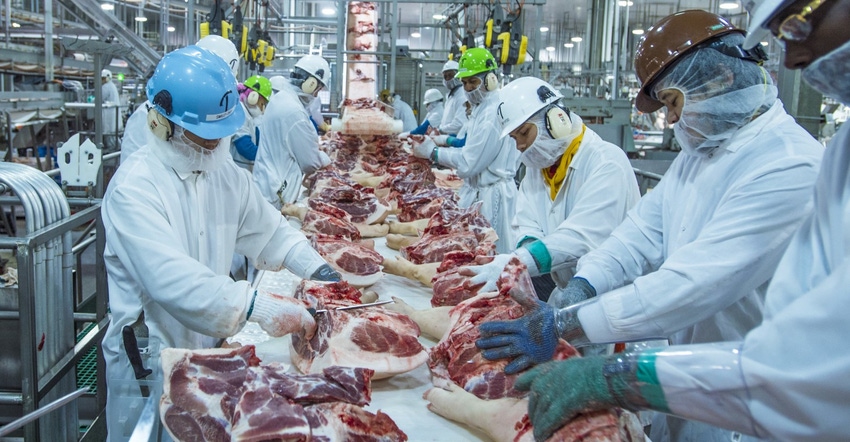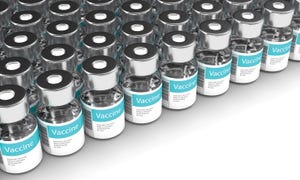State attorneys general, lawmakers file briefs regarding NSIS case
Congressional brief argues USDA rules run contrary to the congressional intent and purpose of enacting the Federal Meat Inspection Act.
March 14, 2022

Several attorneys general, members of U.S. Congress and the meat inspectors' union have filed amici curiae or "friend of the court" briefs in a case concerning the implementation of the USDA's New Swine Inspection System.
The Congressional brief was spearheaded by U.S. Rep. Mark Pocan (D-Wis.) and U.S. Senator Cory Booker of New Jersey, and written by the non-profit law firm Public Justice. Representatives Dina Titus (D-Nev.), Ro Khanna (D-Calif.), Earl Blumenauer (D-Ore.) and Jesús G. "Chuy" García (D-Ill.) also signed on to the brief.
The states' brief was led by Maryland Attorney General Brian E. Frosh and signed by the Attorneys General for Illinois, Massachusetts and Michigan.
The case, Center for Food Safety, et al. v. Thomas Vilsack, No.4:20-cv-00256-JSW (N.D. Cal), centers on the implementation of NSIS, a Trump administration rule that the attorneys general and members of Congress say "greatly undermines the ability of federal inspectors to protect consumers from foodborne illnesses." The Center for Food Safety, Food and Water Watch and the Humane Farming Association have also argued that the rules violate the Federal Meat Inspection Act.
The Congressional brief argues that USDA "promulgated rules related to meat inspection that run contrary to the congressional intent and purpose of enacting the Federal Meat Inspection Act" and that the NSIS rules "are not only inconsistent with the ways Congress directed the FMIA be implemented, but also with the statute's overarching goal of ensuring consumer confidence in a safe meat supply."
The Attorneys General brief argues that the new rules "delegate many inspection duties to private plant employees, who must meet only minimal training requirements, effectively sidelining federal inspectors and placing the public at a greater risk of consuming suspect products."
The American Federation of Government Employees, who represent the federal food safety inspectors employed by USDA, argued that the new rules improperly delegated inspection tasks to private companies. They also "effectively prevent ... inspectors from performing the required post-mortem examination of all carcasses, and parts thereof, by allowing establishment employees to trim carcasses prior to the required inspection."
According to the National Pork Producers Council, NSIS is a voluntary program supported by many years of research and aims to improve the inspection process by shifting FSIS employees' responsibilities to focus on inspection duties more directly related to food safety and animal welfare (like plant sanitation and humane handling). In turn, pre-inspection sorting and quality control tasks would be delegated to plant employees on the line. Final inspection accountability and authority remains with the USDA. By enabling FSIS inspectors to focus on issues more pertinent to animal welfare, food safety and sanitation, NPPC says the NSIS will help to provide for a safer food supply, while allowing packing companies to more effectively use their staff and resources.
The North American Meat Institute also addressed these concerns when the new program was initially released. Under NSIS, plant employees conduct certain manual labor tasks so FSIS inspectors can focus on more technical food safety tasks, which is a more appropriate use of an inspector's time and expertise. However, inspectors still have oversight of the employee-performed tasks. Inspectors, also, continue to inspect 100% of live animals prior to slaughter and all carcasses after slaughter.
In a response to a 2019 NBC News story entitled: "Inspectors Warn Unsafe Pork Could Make its Way to Consumers Under Trump Rule Change," NAMI said:
"America's meat and poultry packers and processors have every incentive to ensure their products are safe. Food safety is the number one priority in both NSIS and traditional pork plants.
"Over the last 50 years, huge advancements in food science, animal handling and meat processing have been embraced and deployed by the meat and poultry industry. In that time, incidence of certain pathogens and injuries to workers have decreased dramatically.
"In both NSIS and traditional systems, facilities may not operate in a way that jeopardizes food safety or worker safety. 100 percent of all animals and carcasses are inspected by a Food Safety and Inspection Service federal inspector. FSIS inspectors have the authority to slow or stop the production line at any time. Line speeds are routinely adjusted to compensate for things like staffing shortages and other variables."
About the Author(s)
You May Also Like



